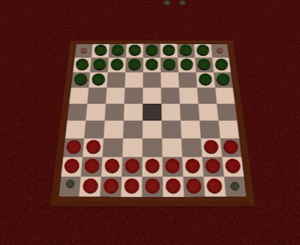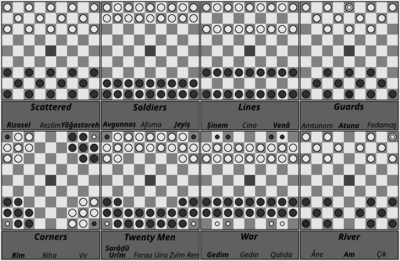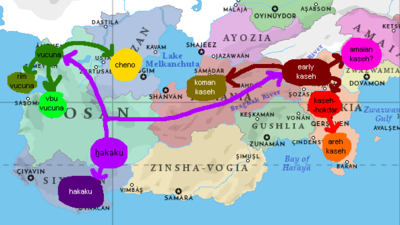Vucuna
 Twenty Men Starting position for King's Vucuna on an 9×9 draughts board | |
| Years active | at least 1,500 |
|---|---|
| Genre(s) | Board game Abstract strategy game Mind sport |
| Players | 2 |
| Setup time | <1 minute |
| Playing time | 30 minutes – 2 hours |
| Random chance | None |
| Skill(s) required | Strategy, tactics |
| Synonym(s) | Vos Byonam, Vosan Draughts |
Vucuna (Vosan: vucuna vucuna [ˈvuʃuna]), also known as Vos Byonam, is a two-player draughts game played primarily in Western Vaniua and the Vos cultural sphere. It is distinguished from other related games by it not starting with a king. It has several different valid starting positions, that are often region-based, but one seen most often in international play is the Scattered arrangement, where only the dark tiles are used.
There are three primary variants of Vucuna as defined by the Vos Vucuna Federation - Regular Vucuna, (Vosan wu vucuna vbu vucuna [ʋu ˈvuʃuna]), otherwise known as Kingless Vucuna, King's Vucuna (Vosan verîs vucuna verîs vucuna [ˈverjis ˈvuʃuna]), and Corners Vucuna (Vosan rîm vucuna rîm vucuna [rjim ˈvuʃuna]) - which differ based on the lack or presence of king pieces, and where the checkers start. Regular Vucuna is now considered to be the default variant, and is the most popular. All variants of Vucuna are played on a 9x9 checkerboard.
Rules
Setup
Two players sit across from each other, picking either colour they choose; the most common colour pairs are red/light and green/dark. The game's pieces are set up in one of a number of starting arrangements; Vucuna may make use of the Scattered, Soldiers, Lines, Twenty Men, Corners, and War arrangement, depending on the region and on whichever kind of Vucuna is being played, with Scattered being the most common, and the one that is used most often in international play. The green player goes first, moving any piece they choose. The two players take turns moving their pieces diagonally, to the next diagonally adjacent free tile, to eliminate all of their opponents' warriors.
Pieces and movement
Men
Uncrowned pieces, known as men in Vucuna (Vosan urî urî, plural urîm urîm) move one step in any direction diagonally to an adjacent space on the board, forwards or backwards. The target space must not be occupied by another piece, unless it is a crown piece in King's Vucuna, but only if it is the same color as the piece being moved. If a man starts its movement from the center square of the board, it can optionally move an additional space in a given direction. It is also possible to capture an opponent's piece from one square further away when moving from the center, provided that the path to do so is unobstructed.
Kings
Kings (Vosan verî verî, plural verîm verîm) are only present in King's Vucuna or Corner Vucuna, and like in other draughts games are distinguished through the addition of a small crown piece placed on top of a warrior. They can move diagonally along any number of vacant squares, and can capture from any distance, provided that the path to do so is unobstructed. This behaviour has earned these pieces the nickname "flying kings" (Vosan coğemim verîm coğemim verîm), in contrast to a "sitting king" in Cheno.
Eliminating
If an adjacent square contains an opponent’s man, and the square immediately beyond it is empty, a player’s man can jump over the opponent’s warrior to take it out of play, also known as eliminating it. Eliminating is not mandatory if it possible can do so; a player can choose not to capture. Once a capture is made, another capture from that space may not be made, unlike in Kaseh. Kings can capture an opponent’s piece from any distance.
Winning the game
The game is won when a player's opponent can no longer make any legal moves. This could be the result of all of a player’s men being eliminated, or all remaining men being trapped by their opponent’s. If it becomes impossible for players to capture each other’s men, e.g. if all of one player’s warriors are on one colour of squares and all of the opponent’s are on the other colour (particularly in the Soldiers and Lines starting arrangements), the game ends and the player with the most men remaining wins. If both players have the same amount of men, the game ends in a draw. In the case of King's Vucuna or Corner Vucuna, the game is automatically won by capturing all of the opponent's kings, unlike in Kinged Kaseh.
Naming
The standard name for the game, Vucuna, derives from Vosan vucuna "to advance". To refer to draughts games in general, though, the term (Vosan bônåm bônåm is used. Variant names (usually loaned) or qualifiers are also used to talk about other draught games that aren't Vucuna.
History
Vucuna, just like other Vaniuan draughts games, is ultimately descended from an ancient Ohanian board game called Qakakun. Spreading to Vosan in the 500s CE, Qåsam was noted to be a big fan of the game, and hence encouraged its spread throughout his kingdom. But, it was unclear where the game pieces were to start, and many regions developed their own starting arrangements, with the practice still carrying on today. Later on, in the 11th century CE, with the advent of not having kings at the start, Vucuna would evolve into its own game. Eventually, around the 16th Century, more games would spawn from Vucuna, including Kingless Vucuna and Corner Vucuna. Kingless Vucuna would eventually rise in popularity around the late 1700s and early 1800s, with the fall in popularity of Vosan's monarchy and the Republic years that followed.
The Vos Vucuna Federation was founded by King Bavi in 1824, in an effort to boost the popularity of the new monarchy and standardizing the game's rules. Regular, King's, and Corner Vucuna were promoted to being the official methods of playing Vucuna, and the Scattered arrangement, originating in Ånevem, was promoted as the default arrangement of pieces in Regular Vucuna. Throughout the colonial era, the game would spread to the colonies of the Second Kingdom of Vosan in Boroso, Shroziq, and later Akulanen. From there, it would become a favorite game in Awating as its own form called Buxuną.
Sport
Official Vucuna tournaments are hosted regularly in Ånevem by the Vos Vucuna Federation, now an independent organisation, under official VVF rulesets.
Regional variants
Buxuną
During the late 19th century, Vosan colonists brought several foreign concepts to Awating, one of which was its popular traditional board game. The local Awatese adapted this into their own native variant of the game. Variously called either puxuno buxuną [busunɐ] (a native approximation of the Vosan name) or peIAhox peyahąx [pejahɐs] (a calque of the Vosan name), the game is played on a standard Vucuna board, except the outer rows and columns of the board are left empty, so that the resulting playing space is a 7x7 grid.
The game progresses similarly to King's Vucuna, except instead of jumping over pieces diagonally, attacking pieces are placed onto the space of the opponent's piece, thereby removing them from play and off the board entirely. Once a piece arrives at any of the opponent's two spaces at either corner of their side, they may move to the corner spaces on the outer "rim" (the blank spaces on the edge of the board) and be crowned leader (Awatese: NruRu ngaruřu [ŋaɾuru], or alternatively peri beri [beri]). A leader is allowed to use the outer rim as normal playing space and, in some variants, may move twice per turn, including captures. Leaders take two pieces to remove; if a leader is attacked, the attacking piece is placed on top of the leader and "rides" on it, until the leader is attacked again by another piece. If this is successful, the leader is removed from play and the two pieces that attacked it combine, becoming a leader piece. This is known as "stealing" (Awatese: peti peti [peti]).
The game ends once all of the opponent's pieces are removed or can no longer make any safe moves.


